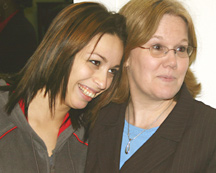Baughâs witness, generosity recalled
Updated: 3/15/07
Baugh's witness, generosity recalled
By Greg Warner
Associated Baptist Press
HOUSTON (ABP)—“‘There was a man sent from God whose name was John,’” Daniel Vestal told about 800 people at a Houston memorial service for Baptist philanthropist John Baugh March 8.
Quoting the biblical description of John the Baptist from the Gospel of John, Vestal said the life of John Baugh had parallels to the New Testament prophet of the same name.
| John Baugh and his wife, Eula Mae |
Like John the Baptist, who prepared the way for Christ, John Baugh humbly pointed others to Christ instead of himself, Vestal said.
Family and friends who were touched by Baugh’s generosity, humility and commitment to Christian freedom gathered at Tallowood Baptist Church, where he was a longtime member, to remember his life.
Baugh, who had been in declining health for several years, died unexpectedly March 5 in San Antonio. He and his wife, Eula Mae, had moved there just a week before to be near their daughter, Babs Baugh.
Although he co-founded the Sysco Corporation and built it into the world’s largest food-service company—with $30 billion in annual sales and 47,500 employees—Baugh often described himself simply as “a grocery salesman.”
Vestal, who was Baugh’s pastor from 1991 to 1996 at Tallowood, called him a man of vision, wisdom, generosity and “dogged determination.”
“He was passionate about what was right,” said Vestal, now national coordinator of the Cooperative Baptist Fellowship.
Baugh campaigned passionately against what he saw as a lack of integrity among fundamentalist leaders who took control of the Southern Baptist Convention from moderates during the 1980s and ’90s. He defended what he thought was right so fervently and tirelessly that some of his friends were uncomfortable and wished he would back off, Vestal said.
“Sometimes he was almost ‘like a voice crying in the wilderness,’” Vestal said—another allusion to John the Baptist.
Baugh also was instrumental in founding Texas Baptists Committed, an organization created to prevent a similar takeover of the Baptist General Convention of Texas, which now works to preserve traditional Baptist principles in denominational life. He was author of The Battle for Baptist Integrity, a book examining the SBC takeover, and was a tireless critic of fundamentalist theology.
Born in Waco, Baugh was known for his support of Texas Baptists institutions. A regent of Baylor University from 1987 to 1996, Baugh and his wife gave the lead gift that helped establish Baylor’s George W. Truett Theological Seminary in 1994.
All told, they donated more than $25 million to Baylor, the world’s largest Baptist university—even though Baugh himself did not have a college degree. He also was a founding trustee of Houston Baptist University and a longtime director of the Baptist Foundation of Texas.
In addition, Baugh was a donor to moderate Baptist causes beyond his home state. Among his beneficiaries were Associated Baptist Press, the Baptist Joint Committee for Religious Liberty and CBF.
Baugh was a champion of Baptist principles, noted Herbert Reynolds, Baylor’s chancellor emeritus. “You know them, but he would want me to repeat them here—the priesthood of the believer, the sufficiency of Scripture, the autonomy of the local church, separation of church and state,” he said to the gathered mourners.
“Largely because of John Baugh” and his advocacy of those Baptist principles, “Texas Baptists have remained free” from the influence of fundamentalism, Reynolds said.
“I have never met or served with a finer, abler, more astute human being,” he said. Of his friend of 35 years, Reynolds added, “He stood with me at times when standing with me was not a very popular sport to be engaged in.”
Duane Brooks, current pastor of Tallowood, called Baugh “the epitome of a Christian gentleman.”
Vestal said Baugh’s life testified to the value of family, church and hard work; to honesty, truthfulness and integrity; and to the truth that it is more blessed to give than to receive.
John and Eula Mae Baugh were generous “long before they had money,” Vestal said, referring to their early days in the food-delivery business. “If they hadn’t learned how to give when they had little, they wouldn’t have given when they had a lot.”
Baugh was 16 when he received his high school diploma. Shortly thereafter, his father died. Baugh hitchhiked from Waco to Houston to search for a job during the Great Depression. He worked his way up to become manager of an A&P grocery store.
And as families began living in a post-War World II environment, Baugh developed a vision.
“Baugh realized that women were not going to work back into the traditional ways of cooking, so he came up with the idea of frozen foods” and named his first company Zero Foods, Reynolds said.
The name denoted the freezing point on the Celsius temperature scale. John and Eula Mae Baugh started the company in their garage when he was 30.
In 1964, Baugh decided to bring together a dozen companies that had worked through Zero Foods in the frozen-food business, creating Sysco. Leaders of the 12 institutions elected Baugh chairman and asked him to divide their holdings.
“They accepted (his decision) because of his acumen for business and fairness,” Reynolds said.
“I asked him for $10 million—$1 million every year for 10 years,” Reynolds recalled in an interview prior to the funeral service. “We would not have Truett Seminary today without that initial commitment through the first decade.”
His legacy also lives on at Baylor through the John F. Baugh Center for Entrepreneurship for both practicing and potential entrepreneurs. The center extends an arm of support to the local and national business community to facilitate new business and further the goals of established businesses. It includes the Institute for Family Business, established in 1987, which is designed to support family-owned businesses.
Baylor dedicated the Baugh-Reynolds Campus of Truett Seminary, a 24,000-sqare-foot facility, in 2002.
Born on a Leap Year Day, Baugh had just turned 91 on Feb. 28.
Baugh is survived by his wife of 71 years, Eula Mae; their daughter, Babs Baugh, and her husband, John Jarrett, of San Antonio; granddaughters Jackie Moore and her husband, Kim Moore, of Fair Oaks Ranch, and Julie Ortiz and her husband, Carlos Ortiz, of Austin; and five great-grandchildren.
Barbara Bedrick of the Baptist General Convention of Texas contributed to this story.
News of religion, faith, missions, Bible study and Christian ministry among Baptist churches, in Texas, the BGCT, the nation and around the world.



